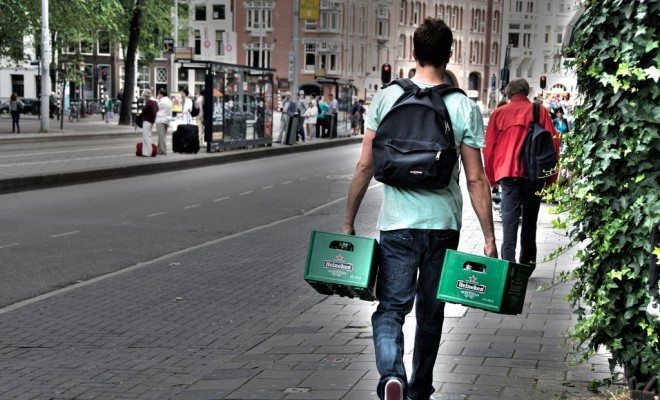
Blogs
The World Cup of Drinking Laws
Last week, Germany edged out a win against the United States in an intense soccer match that ultimately qualified both teams to the next level of competition. Here at Law Street, my coworker Trevor Smith and I decided to use this exciting World Cup game as an excuse to exercise our nerdy legal sides and compare drinking laws in the two nations. After interviewing the crowd at a watch party in DC’s DuPont circle, and researching each country’s laws, we think it is safe to conclude that Germany also wins the drinking law matchup.
In Germany, there are very few restrictions on public alcohol consumption. Most cities ban drinking in their public transit systems, but other than that, they allow drinking on the streets and in their parks. In the United States, there are a few states that allow public drinking in specific entertainment-designated areas, but that’s pretty much it. In DC, where we interviewed people viewing the Germany-U.S. game in a public park, the law states that alcoholic beverages cannot be open in any street, alley, park, sidewalk, or parking area.
The viewing party was the perfect place to interview soccer fans, as many had watched games in a similar locale in Germany, where they were able to have alcohol present. One onlooker told us that in Germany people would typically drink only to get tipsy because of the high alcohol prices at such events. He told us that the presence of alcohol at the events had no negative repercussions and that it made for a better experience. Another man, while motioning at the entire crowd, told us that in Germany, it was “this times 100,” and that it was one “big long party.” Another individual told us that this was “the perfect setting for a beer.”
All but one individual we interviewed told us that they would buy alcohol if it was for sale at the event. With hundreds of people present at the event, the city could have easily made thousands of dollars from alcohol sales, and would also have been able control the flow of alcohol present. That control is important, because there were clearly people in the crowd who brought their own alcohol. We saw beers emerging from bags and many people drinking from bottles that could have been filled with pretty much anything. Many of the people we interviewed said that they considered bringing their own alcohol from home, but decided not to for fear of getting caught by the police or fired
A couple of individuals weren’t so keen on alcohol being present at these kinds of events. An older gentleman told us that, “if alcohol is out of the system, everyone has more fun.” He also said that there was a different mindset abroad towards drinking. He thought that Americans would not be able to handle public drinking very well and that, “chaos would probably ensue, we tend to overdo it.” Another woman expressed concerns that Americans would not be able to adapt to open container laws at first, but said, “in the long run it would be a positive change, as people got used to their newfound freedom.”
One question that we asked every individual was if they thought open container laws should change or stay the same. Not surprisingly, all those we interviewed who have been abroad thought the United States should change its open container laws. There were also those who thought serving alcohol at public events should be reserved for viewing parties like the one we attended, but were hesitant to commit to the broad kind of laws Germany has.
Although there was no legal alcohol present at the viewing party, it was clear that everyone still had a great time. But, we do agree with the majority of the fans that were watching–alcohol could have both improved the game’s atmosphere and brought in revenue for the city. The stereotype of Americans as too rowdy, or too rambunctious, or too destructive is sometimes true, but only because we put alcohol on such a pedestal. There are high school kids in Germany who are able to buy a beer, and then walk down the street while drinking that beer, but many American college students can’t even walk into a bar. A more relaxed and normalized attitude towards drinking might keep people from overdoing it.

So maybe one day this will be the norm!
Check out the bracket below to see which countries that made it to the knockout stage have the most relaxed drinking laws. We created our bracket by examining which countries have the most generous laws when it comes to drinking in public and drinking age!
Round of 16:
Brazil vs. Chile
Winner: Brazil. In Brazil you’re allowed to drink in public places. Chile’s laws are a bit stricter–it’s usually illegal to drink publicly.
Colombia vs. Uruguay
Winner: Colombia. Both countries allow you to purchase and consume alcohol at the age of 18, but Uruguay loses this round because they’re trying to enforce stricter alcohol laws, like a ban on happy hour
France vs. Nigeria
Winner: Nigeria. In France you cannot drink in public, but Nigeria has much looser open container laws!
Germany vs. Algeria
Winner: Germany. Germany has a lower drinking age and more relaxed open container laws.
The Netherlands vs. Mexico
Winner: The Netherlands. The Netherlands has no national laws against drinking in public–although some cities have individual laws against it. Many areas in Mexico do not allow public drinking, so the Netherlands comes out on top.
Argentina vs. Switzerland
Winner: Switzerland. While open container laws don’t vary much between the two countries, you’re allowed to start drinking beer and wine at the age of 16 and spirits at 18.
Belgium vs. USA
Winner: Belgium. In Belgium you’re allowed to start drinking beer and wine at the age of 16, and liquor at 18. The United States requires an age of 21 for every type of alcoholic drink. Also public drinking is allowed in Belgium, unlike in the United States.
Greece vs. Costa Rica
Winner: Greece has open container laws allowing drinking outside. Costa Rica does not.
Quarter-Finals
Germany vs Nigeria
Winner: Germany. Both have open container laws, but the drinking age is two years earlier in Germany.
Greece vs. Netherlands
Winner: Greece. In Greece, you can buy alcohol at 18 in a bar, but there is no age limit to buying alcohol at liquor stores. The Netherlands has much stricter laws.
Switzerland vs. Belgium
Winner: Belgium. While both have similar drinking and open container laws, it is more socially acceptable to walk down the street with a beer in Belgium.
Colombia vs. Brazil
Winner: Colombia. Both are lenient when it comes to drinking, but some cities in Brazil, for example Recife, have started to crack down.
Semi-Finals
Greece vs. Belgium
Winner: Belgium. Belgium wins because in some places in Greece, public drinking is not socially acceptable, even if it is lawful.
Colombia vs. Germany
Winner: Germany. Germany wins, because you can buy and drink alcohol publicly at a younger age
Finals
Belgium vs. Germany
Winner: These two countries often debate who makes the best beer. But Germany wins this particular contest because of their lower drinking age.
Go forth and have fun! But make sure that you always follow the local drinking laws, regardless of where you are, and stay safe whenever you consume alcohol!
—
Matt DeWilde (@matt_dewilde25) is a member of the American University class of 2016 majoring in politics and considering going to law school. He loves writing about politics, reading, watching Netflix, and long walks on the beach. Contact Matt at staff@LawStreetMedia.com.
Trevor Smith (@TSmith1211) is a homegrown DMVer studying Journalism and Graphic Design at American University. Upon graduating he has hopes to work for the US State Department so that he can travel, learn, and make money at the same time. Contact Trevor at staff@LawStreetMedia.com.
Featured image courtesy of [Neil Cooler via Flickr]









Comments